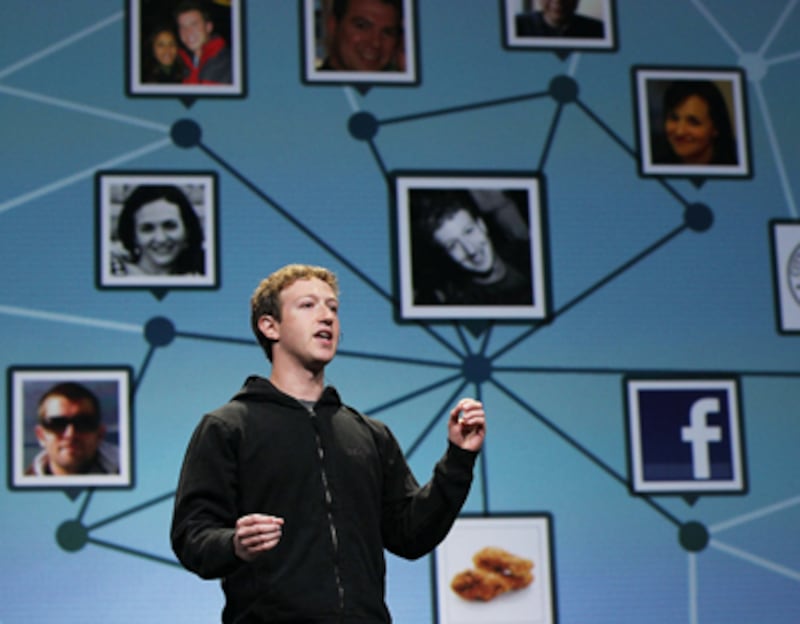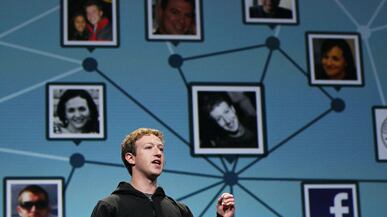Facebook launched a real messaging service today, replacing its clunky messaging system with something that foments a direct, head-to-head battle with Google for dominance of the Internet.
The new Facebook system consists of three fundamental innovations: It unifies instant messages, SMS texts, and email into one in box; it turns all your interactions—ever—with any correspondent into one continuous thread which you can use to look back over your mutual history; and it uses its knowledge of your social interactions and friends on Facebook to sort your email for you so you are more likely to see the messages you care about first. This last feature can be modified to an individual user's preference, but will likely out-perform any similar system currently on the market, including the one in Gmail.
Email is, as we all know, a horribly broken system. It is what almost all of us lean on the most heavily to get our work done. Yet we all know it is inefficient and unwieldy. Now Facebook's innovations aim to use its so-called "social graph," the set of relationships you have with another user, to remake daily electronic communication.
More broadly, Facebook threatens Google because it represents a different way of functioning online. While Google is just a website you go to to get something done—albeit something critical and immensely useful—Facebook is a place where people increasingly live online. It is attempting to turn the entire Internet social. In addition, Facebook has become the world's largest website—by far—in terms of time spent.
But what should really worry Google is that Facebook is increasingly pulling more of the Internet toward itself. Websites of all kinds are increasingly incorporating Facebook's platform tools as they realize the power of tapping its viral distribution mechanism. Most everything a user does gets transmitted to their friends via Facebook's software. Today well over 1 million sites include the "like" button. A user who clicks "like" on your Web page is in many cases more valuable than one who clicks on a link in a list of Google results. The "liker" is broadcasting their affection to his or her friends in their social graph. About 600 million people worldwide have defined one inside Facebook.
The two companies have been competing over minutiae for a long time. As far back as early 2005, Mark Zuckerberg sat at a folding table in the lobby of a computer-science building at Stanford with a sign reading "Why Work at Google? Come to Thefacebook." It took a while for the message to sink in, but today about 300 former Google employees are working at Facebook, according to a search on employment network LinkedIn. The defectors include Facebook chief operating officer Sheryl Sandberg, advertising boss David Fischer, head of communications and public policy Elliot Schrage, and numerous top engineers. Last week, Google gave its entire 23,000-person workforce a 10 percent raise, widely interpreted as a response to poaching by Facebook, among others. And TechCrunch reported this week that Google gave one employee a $3.5 million restricted stock bonus to convince him to turn down a Facebook offer. Another battle has been raging in recent weeks as Google has refused to allow Facebook users to import their Gmail address books, unless Facebook allows people also to extract their friends' addresses into Gmail, which Facebook refuses to do.
• David Kirkpatrick: Inside the Secret New Internet Browser• Thomas E. Weber: 10 Biggest Secrets of Facebook’s Newsfeed
Now, with its richly-featured email system which gives every Facebook user an @ facebook.com address, the social network is beginning a direct assault on one of Google's crown jewels. Why does Gmail matter? First, because it is the biggest part of Google's product line that invites you, like Facebook, to come and stay awhile. Second, Google CEO Eric Schmidt and others there have acknowledged that what is called "social search" is one of their biggest strategic challenges. In order to address it, Google must create its own social graph. The third-largest email service (after Yahoo and Hotmail), Gmail has about two hundred million users. Handled properly, Google might be able to turn those users' address lists into a social graph. It already tried, clumsily, this year with Google Buzz, which immediately out of the gate was hit with massive privacy complaints. It hasn't recovered.
Google will almost certainly sometime soon make a more concerted effort to become a player in the social Web. It has bought a number of small social sites in areas like gaming. But its best hope to counter Facebook would be by somehow combining Gmail with its biggest slightly social property, YouTube. But that strategy depends on the continued health of Gmail. The way to think about this new Facebook messaging service is not to ask yourself "Would I use it?" Even if the answer is yes, far more significant is what happens to the hundreds of millions of young people worldwide who come online without ever becoming regular email users. That is just about everyone under 18, and many over that age. Instead, they are doing almost all their communicating inside Facebook.
Once they begin heading into adulthood they will almost certainly require more sophisticated messaging, including email. What system would be most likely to command their attention other than the one they were already by default using inside Facebook? Facebook's new messaging system will hurt Google most by depriving Gmail of what would otherwise be potential new users.
Another key thought when looking at Facebook's new messaging system: its monumental but insufficiently appreciated recent deal with Skype. Facebook users can now easily make calls to Facebook friends inside Skype. Before long you will be able to make voice or video calls simply by clicking a name in your Facebook friend list inside the service. Think of it—in addition to doing all the other things you can do inside of Facebook, you will be able to do your calling and all sorts of messaging there as well. Some are already wondering if Skype calls will be able to join the thread of communications between users on Facebook, along with emails, IMs and texts. Facebook is becoming its own alternate Internet, loaded with functionality you simply cannot find elsewhere.
One final thought—many wonder when Facebook's long-awaited IPO might occur. Zuckerberg is famously aiming to delay it as long as possible. However, if a feature battle with a more socially savvy Google finally does emerge, as I believe is inevitable, Facebook will then face an additional argument for going public. As hot new capabilities emerge in startups all around the world, Facebook will get into bidding wars for them with Google. Having a clearly valued currency in the form of a public stock will allow Facebook to move more quickly. (Today, Facebook's stock is trading in private markets at a range of prices, though big transactions are occuring at about a $30 billion valuation for the company.)
Facebook is becoming its own alternate Internet, loaded with functionality you simply cannot find elsewhere.

The social war between the Facebook/Microsoft axis and Google will help define the Web's next decade. It's the battle between likes and links.
David Kirkpatrick writes about technology for the Daily Beast. A former Fortune reporter, he is the author of The Facebook Effect: The Inside Story of the Company that is Connecting the World.






